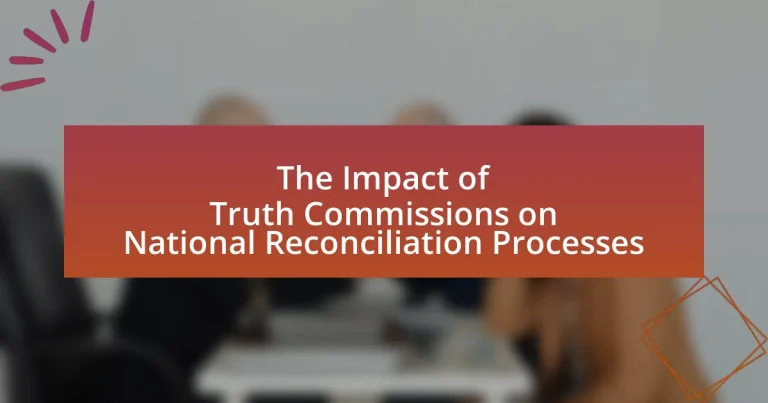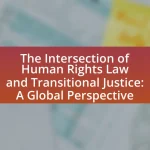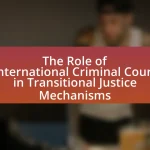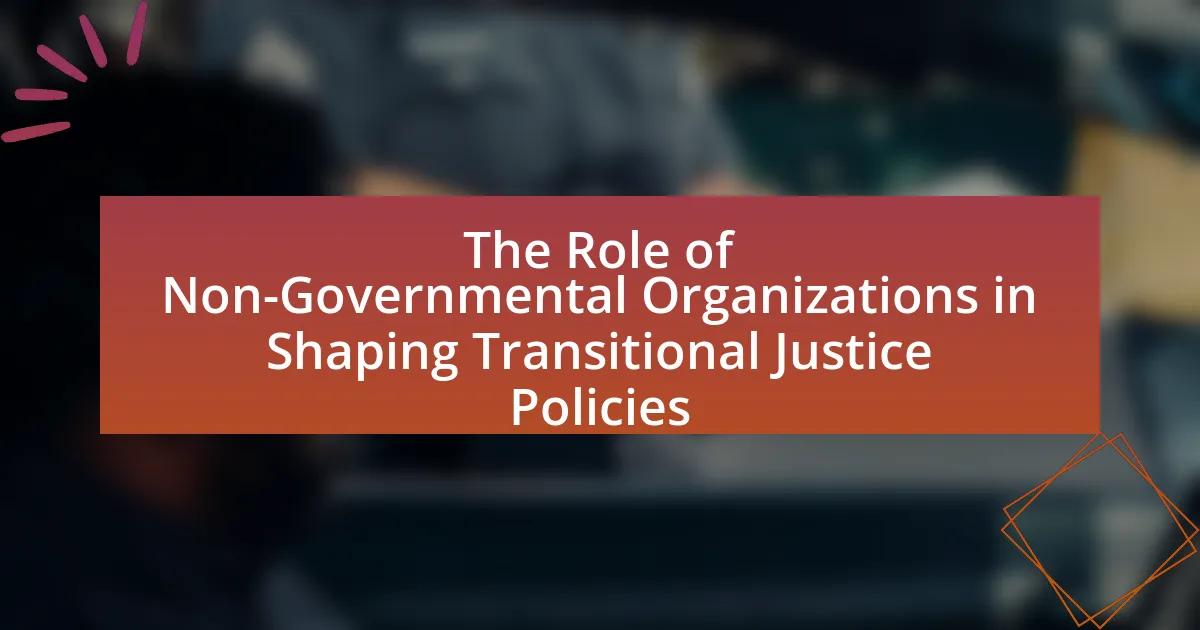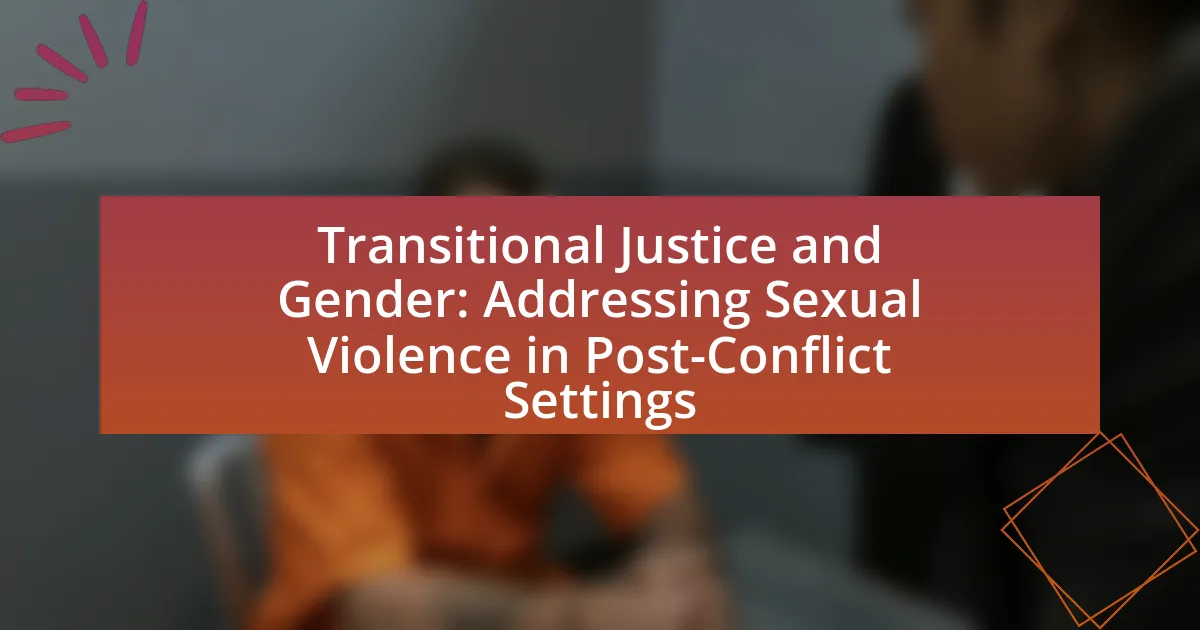Truth commissions are official bodies established to investigate human rights violations and atrocities during periods of conflict or authoritarian rule, with the primary aim of uncovering the truth, promoting accountability, and facilitating national reconciliation. This article examines the functions of truth commissions in post-conflict societies, the processes involved in their establishment, and the methods they use to gather testimonies and evidence. It also discusses the importance of truth commissions for acknowledging past atrocities, their impact on victims and survivors, and the broader societal changes they can bring about. Additionally, the article addresses the challenges faced by truth commissions, including political resistance and resource limitations, and highlights best practices for enhancing their effectiveness and legitimacy.
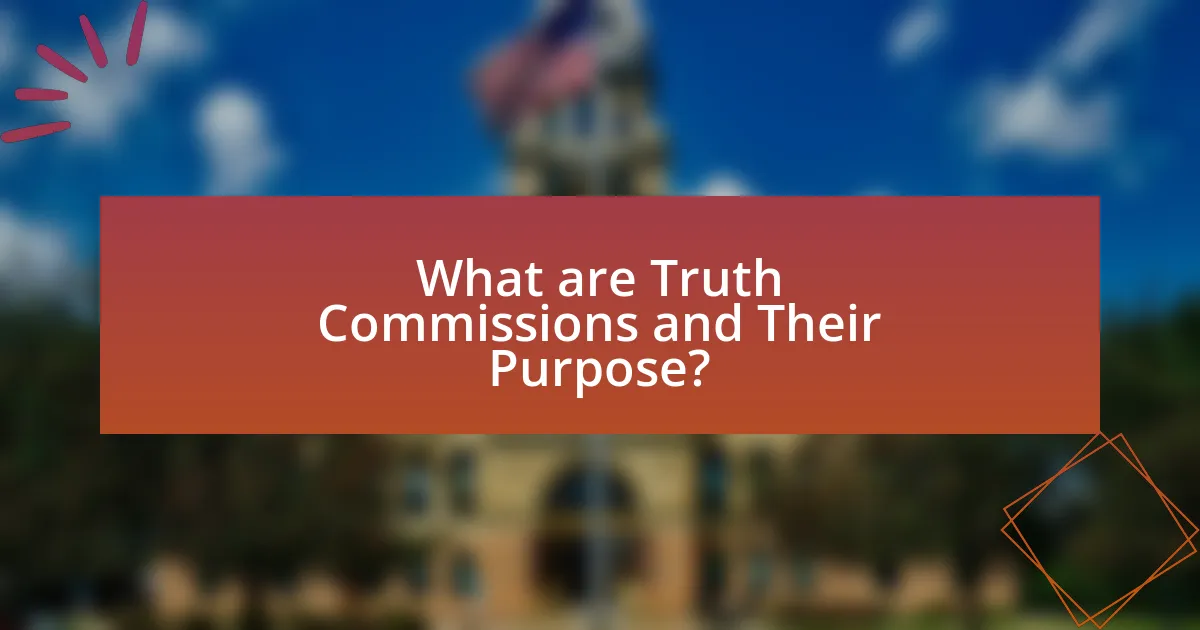
What are Truth Commissions and Their Purpose?
Truth commissions are official bodies established to investigate and report on human rights violations and atrocities that occurred during periods of conflict or authoritarian rule. Their primary purpose is to uncover the truth about past abuses, promote accountability, and facilitate national reconciliation by acknowledging victims’ experiences and fostering dialogue among affected communities. For instance, the South African Truth and Reconciliation Commission, established in 1995, aimed to address the injustices of apartheid by documenting human rights violations and providing a platform for victims to share their stories, ultimately contributing to the country’s transition to democracy.
How do Truth Commissions function in post-conflict societies?
Truth Commissions function in post-conflict societies by investigating and documenting human rights violations that occurred during periods of conflict. These commissions aim to uncover the truth about past atrocities, promote accountability, and facilitate national healing. For instance, the South African Truth and Reconciliation Commission, established in 1995, provided a platform for victims to share their experiences and for perpetrators to confess their crimes in exchange for amnesty, thereby fostering a collective understanding of the past. This process not only helps to acknowledge the suffering of victims but also contributes to building a foundation for reconciliation and preventing future conflicts by addressing grievances and promoting dialogue among affected communities.
What processes are involved in establishing a Truth Commission?
Establishing a Truth Commission involves several key processes, including the identification of the need for a commission, the establishment of legal frameworks, the appointment of commissioners, and the development of operational guidelines. The need for a Truth Commission typically arises in post-conflict or transitional societies seeking to address past human rights violations and promote national reconciliation. Legal frameworks are established to define the commission’s mandate, powers, and duration, often through legislation or executive orders. Appointing commissioners, who are usually independent experts with credibility, is crucial for ensuring the commission’s legitimacy. Finally, operational guidelines are developed to outline the commission’s procedures for gathering testimonies, conducting investigations, and reporting findings. These processes are essential for the effective functioning of a Truth Commission, as evidenced by historical examples such as South Africa’s Truth and Reconciliation Commission, which played a significant role in the country’s transition from apartheid to democracy.
How do Truth Commissions gather testimonies and evidence?
Truth Commissions gather testimonies and evidence through structured interviews, public hearings, and the collection of documents and physical evidence. These commissions often invite victims, witnesses, and perpetrators to share their experiences in a safe environment, ensuring confidentiality and protection for participants. For instance, the South African Truth and Reconciliation Commission utilized public hearings to encourage testimonies from individuals affected by apartheid, which resulted in over 21,000 statements being collected. This method not only facilitates the documentation of human rights violations but also fosters a collective memory essential for national reconciliation.
Why are Truth Commissions important for national reconciliation?
Truth Commissions are important for national reconciliation because they provide a structured process for uncovering the truth about past human rights violations and fostering dialogue among affected communities. By documenting abuses and acknowledging victims’ experiences, Truth Commissions help to validate the suffering endured, which is essential for healing and rebuilding trust in society. For instance, the South African Truth and Reconciliation Commission, established in 1995, played a crucial role in addressing the atrocities of apartheid, allowing victims to share their stories and promoting a collective understanding of the past. This process not only aids in individual healing but also contributes to a broader societal reconciliation by creating a shared narrative that can prevent future conflicts.
What role do they play in acknowledging past atrocities?
Truth commissions play a crucial role in acknowledging past atrocities by providing a formal platform for victims and perpetrators to share their experiences and testimonies. These commissions facilitate public recognition of human rights violations, which is essential for healing and reconciliation in post-conflict societies. For instance, the South African Truth and Reconciliation Commission, established in 1995, documented over 21,000 human rights violations, allowing for a collective acknowledgment of the injustices faced during apartheid. This process not only validates the suffering of victims but also promotes accountability and fosters a shared historical narrative, which is vital for preventing future atrocities.
How do they contribute to healing and rebuilding trust in society?
Truth commissions contribute to healing and rebuilding trust in society by providing a platform for victims to share their experiences and for perpetrators to acknowledge their actions. This process fosters transparency and accountability, which are essential for restoring faith in institutions. For instance, the South African Truth and Reconciliation Commission revealed the extent of human rights violations during apartheid, allowing for public acknowledgment of suffering and facilitating dialogue among communities. Research indicates that societies with truth commissions experience lower levels of violence and increased social cohesion, as seen in post-conflict nations like Sierra Leone and Guatemala, where these commissions helped to address grievances and promote understanding.
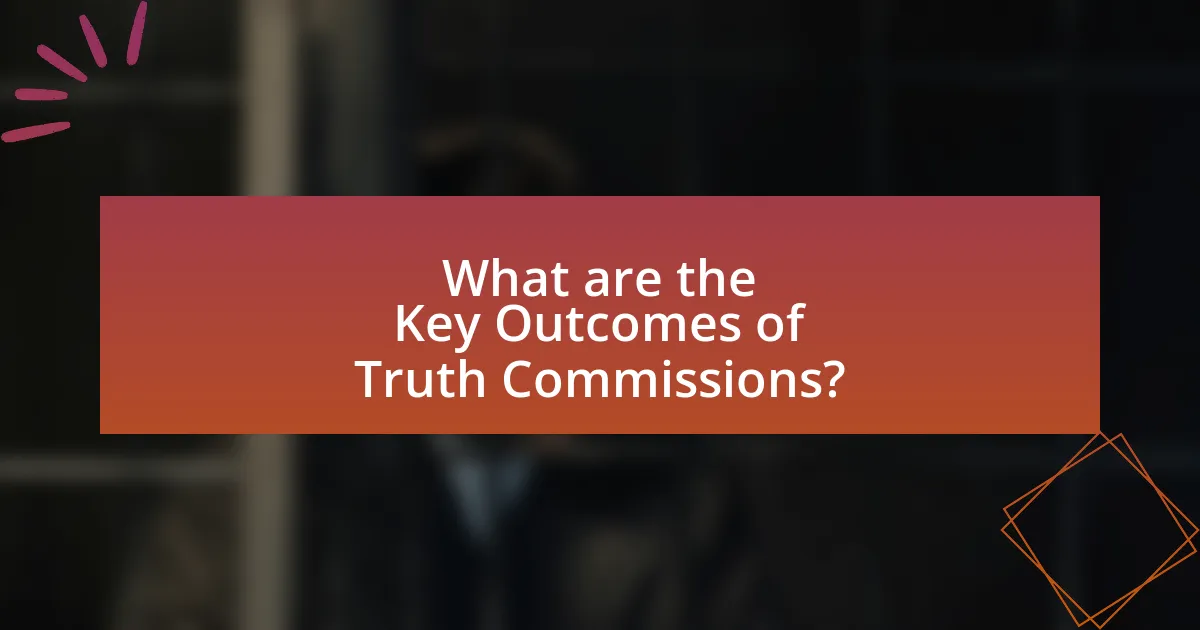
What are the Key Outcomes of Truth Commissions?
The key outcomes of truth commissions include the establishment of an official record of past human rights violations, the promotion of national reconciliation, and the provision of recommendations for institutional reforms. Truth commissions, such as South Africa’s Truth and Reconciliation Commission, have documented atrocities committed during periods of conflict or authoritarian rule, thereby acknowledging victims’ experiences and fostering societal healing. Additionally, these commissions often facilitate dialogue among conflicting parties, contributing to a shared understanding of history, which is essential for preventing future violence. Their recommendations frequently lead to legal and policy reforms aimed at strengthening human rights protections and accountability mechanisms, as evidenced by the reforms implemented in countries like Chile and Argentina following their respective truth commissions.
How do Truth Commissions impact victims and survivors?
Truth Commissions significantly impact victims and survivors by providing a platform for acknowledgment, validation, and healing. These commissions facilitate the documentation of human rights abuses, allowing victims to share their experiences and receive recognition for their suffering. For instance, the South African Truth and Reconciliation Commission (TRC) enabled thousands of victims to testify, which not only validated their experiences but also contributed to a collective memory of the past. Research indicates that such processes can lead to psychological healing and a sense of closure for survivors, as evidenced by studies showing reduced levels of trauma symptoms among those who participated in truth-telling initiatives. Furthermore, Truth Commissions often promote societal healing by fostering dialogue and understanding, which can help prevent future violence and contribute to national reconciliation.
What psychological effects do Truth Commissions have on individuals?
Truth Commissions have significant psychological effects on individuals, primarily facilitating healing and promoting a sense of closure for victims of past atrocities. These commissions provide a platform for individuals to share their experiences, which can lead to emotional relief and validation of their suffering. Research indicates that participation in Truth Commissions can reduce feelings of isolation and trauma, as individuals feel heard and acknowledged by society. For instance, the South African Truth and Reconciliation Commission demonstrated that public testimonies helped many victims process their trauma, contributing to psychological recovery. Additionally, the act of truth-telling can foster a collective memory that aids in societal healing, as seen in various post-conflict nations.
How do they facilitate the empowerment of marginalized groups?
Truth commissions facilitate the empowerment of marginalized groups by providing a platform for their voices to be heard and acknowledged. These commissions often investigate human rights violations and document the experiences of marginalized communities, which helps to validate their struggles and promote social justice. For instance, the South African Truth and Reconciliation Commission (TRC) allowed victims of apartheid to share their stories, leading to greater public awareness and recognition of their suffering. This process not only fosters healing but also encourages policy changes that address systemic inequalities, thereby empowering these groups in the long term.
What are the broader societal impacts of Truth Commissions?
Truth Commissions have significant broader societal impacts, primarily by fostering national reconciliation and healing after periods of conflict or authoritarian rule. They facilitate public acknowledgment of past atrocities, which can help to restore trust in institutions and promote social cohesion. For instance, the South African Truth and Reconciliation Commission, established in 1995, played a crucial role in addressing the injustices of apartheid, leading to a more unified society by encouraging dialogue and understanding among diverse groups. Additionally, Truth Commissions often contribute to the establishment of historical records, which can prevent the recurrence of violence by educating future generations about the past. This process of truth-telling can also empower victims and marginalized communities, giving them a voice and promoting restorative justice.
How do they influence public discourse and historical narratives?
Truth commissions influence public discourse and historical narratives by uncovering and documenting human rights violations, thereby shaping collective memory and societal understanding. For instance, the South African Truth and Reconciliation Commission (TRC) revealed the extent of apartheid-era abuses, which significantly altered public perceptions and discussions about race relations in the country. The TRC’s findings were widely disseminated, leading to a national dialogue on forgiveness and reconciliation, and influencing educational curricula and media representations of history. This process not only validated the experiences of victims but also challenged dominant narratives, fostering a more inclusive historical account that acknowledges past injustices.
What changes do they bring about in legal and political frameworks?
Truth commissions bring about significant changes in legal and political frameworks by promoting accountability and establishing a foundation for transitional justice. They often lead to the creation of new laws and policies aimed at addressing past human rights violations, thereby influencing legislative reforms. For instance, the South African Truth and Reconciliation Commission resulted in the Promotion of National Unity and Reconciliation Act, which facilitated legal processes for reparations and amnesty. Additionally, truth commissions can reshape political discourse by fostering a culture of transparency and encouraging public engagement in democratic processes, as seen in countries like Chile and Argentina, where commissions have influenced public policy and national narratives regarding human rights.
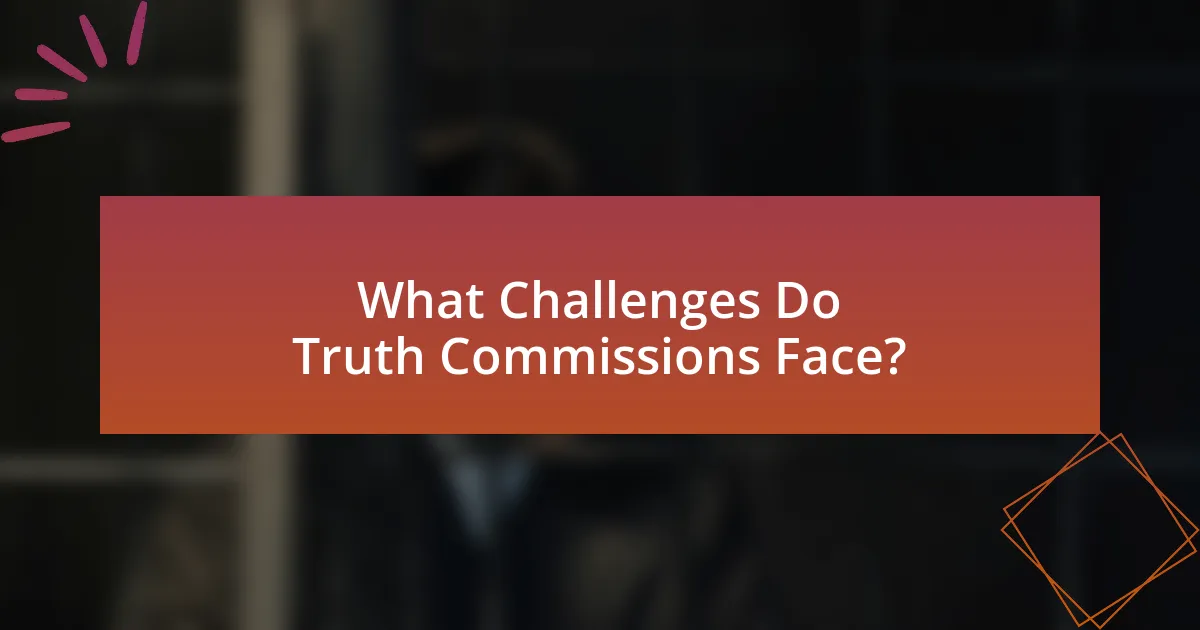
What Challenges Do Truth Commissions Face?
Truth commissions face several significant challenges, including political resistance, lack of resources, and societal divisions. Political resistance often arises from governments or groups that fear accountability for past actions, which can hinder the commission’s ability to operate effectively. For instance, in South Africa, the Truth and Reconciliation Commission encountered pushback from certain political factions that were reluctant to disclose information about human rights abuses. Additionally, truth commissions frequently operate with limited financial and human resources, which restricts their capacity to conduct thorough investigations and outreach. In countries like Guatemala, the Comisión de Esclarecimiento Histórico struggled with insufficient funding, impacting its ability to fulfill its mandate. Lastly, deep societal divisions can complicate the acceptance of findings, as different groups may contest the narratives presented by the commission, leading to further polarization. This was evident in the case of the truth commission in Sierra Leone, where conflicting interpretations of the civil war’s causes and consequences emerged among various factions.
What obstacles hinder the effectiveness of Truth Commissions?
Obstacles that hinder the effectiveness of Truth Commissions include lack of political will, insufficient resources, and societal resistance. Political will is crucial for the implementation of recommendations made by Truth Commissions; without it, findings may be ignored or suppressed, as seen in the case of the South African Truth and Reconciliation Commission, where some political leaders resisted accountability measures. Insufficient resources can limit the scope and reach of investigations, leading to incomplete narratives and unaddressed grievances, as evidenced by the challenges faced by the Guatemalan Commission for Historical Clarification, which struggled with funding and staffing. Societal resistance often manifests in denial or fear among communities, which can obstruct open dialogue and acceptance of the Commission’s findings, as observed in various post-conflict societies where victims and perpetrators are reluctant to engage in the reconciliation process.
How do political resistance and lack of resources affect their work?
Political resistance and lack of resources significantly hinder the effectiveness of truth commissions in their work. Political resistance often manifests as government obstruction, limiting the commission’s ability to access necessary information and conduct thorough investigations, which undermines their credibility and public trust. For instance, in countries like South Africa, political pushback from certain factions delayed the commission’s proceedings and affected its ability to hold accountable those responsible for human rights violations.
Additionally, a lack of resources, including funding and personnel, restricts the commission’s capacity to carry out comprehensive outreach, gather testimonies, and provide adequate support to victims. In the case of the Guatemalan Truth Commission, insufficient financial backing led to a limited scope of investigation and a failure to address many human rights abuses, ultimately impacting the reconciliation process. These factors collectively impede the commission’s goals of promoting transparency, accountability, and healing within society.
What issues arise regarding the credibility of testimonies?
Issues regarding the credibility of testimonies include inconsistencies, biases, and the potential for coercion. Inconsistencies can arise when witnesses provide conflicting accounts, undermining the reliability of their statements. Biases may stem from personal experiences or affiliations, leading witnesses to present skewed narratives that reflect their perspectives rather than objective truths. Additionally, testimonies can be influenced by external pressures, such as threats or promises, which can compromise the authenticity of the information shared. Research indicates that these factors significantly affect the perceived validity of testimonies in the context of truth commissions, impacting their effectiveness in promoting national reconciliation.
How can Truth Commissions overcome these challenges?
Truth Commissions can overcome challenges by ensuring inclusive participation, establishing clear mandates, and fostering public trust. Inclusive participation allows diverse societal groups, including victims and marginalized communities, to contribute, which enhances legitimacy and comprehensiveness. Clear mandates define the scope and objectives, guiding the commission’s work and preventing mission drift. Fostering public trust involves transparent processes and effective communication, which can be achieved through regular updates and community engagement initiatives. Historical examples, such as South Africa’s Truth and Reconciliation Commission, demonstrate that these strategies can lead to successful outcomes in addressing past injustices and promoting national reconciliation.
What strategies can be employed to enhance their legitimacy?
To enhance the legitimacy of truth commissions, establishing clear legal frameworks and ensuring transparency in their operations are essential strategies. Clear legal frameworks provide a solid foundation for the commission’s authority and mandate, which fosters public trust. Transparency in processes, such as open hearings and accessible reports, allows for public scrutiny and engagement, reinforcing the commission’s credibility. Research indicates that truth commissions with strong legal backing and transparent practices are more likely to be perceived as legitimate by the public, as seen in the South African Truth and Reconciliation Commission, which effectively utilized these strategies to gain widespread acceptance and support.
How can community engagement improve their effectiveness?
Community engagement can significantly improve the effectiveness of truth commissions by fostering trust and collaboration between the commission and the affected communities. When communities actively participate in the truth commission process, they provide valuable insights and testimonies that enhance the commission’s understanding of historical injustices. For instance, research by the International Center for Transitional Justice indicates that inclusive engagement leads to more comprehensive and accurate findings, which are crucial for reconciliation efforts. Furthermore, community involvement can increase public support for the commission’s recommendations, as seen in the case of South Africa’s Truth and Reconciliation Commission, where community participation helped legitimize the process and outcomes.
What Best Practices Can Be Adopted for Successful Truth Commissions?
Successful truth commissions should adopt best practices such as ensuring inclusivity, maintaining independence, and fostering transparency. Inclusivity involves engaging diverse community stakeholders, including victims, to ensure all voices are heard, which enhances legitimacy and public trust. Independence is crucial; commissions must operate free from political interference to uphold credibility, as seen in the South African Truth and Reconciliation Commission, which gained respect due to its autonomous structure. Transparency in processes and findings promotes accountability and encourages public participation, as evidenced by the success of the Peruvian Truth and Reconciliation Commission, which published comprehensive reports accessible to the public. These practices collectively contribute to the effectiveness of truth commissions in facilitating national reconciliation.
What lessons can be learned from successful Truth Commission cases?
Successful Truth Commission cases demonstrate the importance of transparency, accountability, and public participation in the reconciliation process. For instance, the South African Truth and Reconciliation Commission (TRC) effectively facilitated dialogue between victims and perpetrators, fostering a collective understanding of past injustices. This approach not only helped to acknowledge the suffering of victims but also encouraged societal healing by promoting forgiveness and moving forward. Additionally, successful commissions often emphasize the need for comprehensive documentation of human rights violations, as seen in the Chilean National Commission on Truth and Reconciliation, which provided a historical record that informs future generations. These lessons highlight that inclusive processes and thorough documentation are crucial for achieving lasting national reconciliation.
How can international support enhance the work of Truth Commissions?
International support can enhance the work of Truth Commissions by providing necessary resources, expertise, and legitimacy. This support often includes financial assistance, which enables commissions to conduct thorough investigations and outreach efforts, as seen in the case of South Africa’s Truth and Reconciliation Commission, which received international funding that facilitated its extensive public hearings and documentation processes. Additionally, international legal and human rights expertise can guide commissions in adhering to best practices, ensuring that their findings are credible and respected. For instance, the involvement of international organizations like the United Nations has historically helped bolster the credibility of truth commissions, as evidenced by the UN’s support for the Sierra Leone Truth and Reconciliation Commission, which contributed to its acceptance and effectiveness in promoting national healing.
